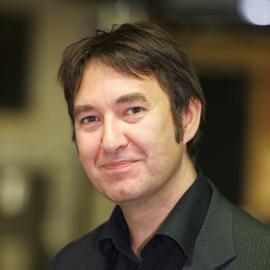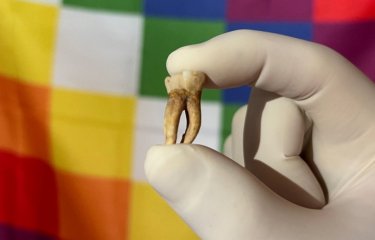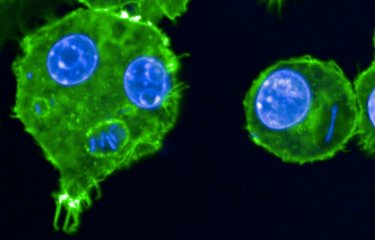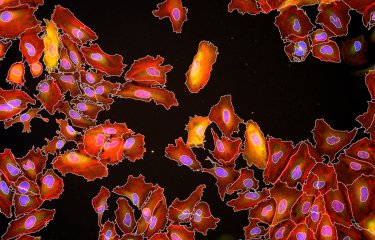Scientists at the Institut Pasteur demonstrated in 2003 that there is a genetic component in autism. The same team has now studied the impact of various mutations on the symptoms of the disorder.
Although autistic individuals experience social communication difficulties and restricted, stereotyped interests, these symptoms can vary in intensity and there is not one single form of autism. Autism is also often associated with other conditions such as intellectual disability, epilepsy and mutism. The heterogeneity of autism makes research complicated, especially when scientists are trying to understand the influence of genetics on the disorder.
We have known since 2003 that there is a genetic component in autism,
thanks to the work of Thomas Bourgeron's team at the Institut Pasteur. Various mutations have subsequently been identified as predisposing factors.
In collaboration with a team from Cambridge, scientists at the Institut Pasteur studied the genomes of 24,000 autistic patients. They examined the correlation between the patients' genomes and their symptoms, associated developmental disabilities, whether or not they have an intellectual disability and their sex. The scientists initially identified six main factors for autism. They then observed the impact of de novo mutations and polygenic scores on these factors. De novo mutations are mutations found in the genomes of autistic or non-autistic children but not in the genomes of their parents. Polygenic scores (PGS) are calculated on the basis of genome-wide association study (GWAS) data for various traits such as autism, attention deficit hyperactivity disorder (ADHD) and educational attainment. A PGS summarizes all the effects of frequent variants in the genome for a given trait. Individuals with a high PGS for autism have a higher probability of being diagnosed as autistic.
"Polygenic scores provide an estimate of the way in which frequent genetic variations in the population contribute to the development of autism. The effect of these genetic variations on autism, ADHD and educational attainment is very small, but there is a wide range of variations and their cumulative effect may increase or reduce the probability of being autistic or the severity of the condition," explains Freddy Cliquet, an engineer in the Institut Pasteur's Human Genetics and Cognitive Functions Unit.
The team was able to identify differences between men and women for some factors of autism. For example, self-injurious behavior occurs more frequently in autistic women than autistic men, and autistic men more often have more severe language difficulties than autistic women. In terms of genetic architecture, the presence of a de novo mutation mainly affects the intellectual quotient of autistic individuals. The authors also observed that people with a high PGS for ADHD had higher autism severity scores but that autism severity scores were lower for people with a high PGS for educational attainment.

Thomas Bourgeron, Head of the Institut Pasteur's Human Genetics and Cognitive Functions Unit.
For the first time at this scale, we can go further than simply associating a gene with autism. We can understand the effect of different genetic architectures of autism on the different components of this complex syndrome.
"For the first time at this scale, we can go further than simply associating a gene with autism. We can understand the effect of different genetic architectures of autism on the different components of this complex syndrome. These results provide us with more information about autism subtypes so that we can identify more appropriate support for each autistic individual," explains Thomas Bourgeron, Head of the Institut Pasteur's Human Genetics and Cognitive Functions Unit.
The scientific paper reporting on this research is the winner of the 2022 ISPG Gershon Paper of the Year Award, presented by the International Society of Psychiatric Genetics (ISPG). The award is given to a paper which has been published and reported on outstanding achievement in the field of psychiatric genetics in the past year.
Source
Genetic correlates of phenotypic heterogeneity in autism, Nature Genetics, 2 juin 2022
DOI : 10.1038/s41588-022-01072-5
Varun Warrier1#, Xinhe Zhang1, Patrick Reed1, Alexandra Havdahl2,3,4, Tyler M Moore5,6, Freddy Cliquet7, Claire S Leblond7, Thomas Rolland7, Anders Rosengren8,9, EU-AIMS-LEAP10, iPSYCH-Autism Working Group11, Spectrum 10K and APEX Consortia12, David H Rowitch13, Matthew E Hurles14, Daniel H Geschwind15,16,17,18, Anders D Børglum8,19,20, Elise B Robinson21,22,23, Jakob Grove8,19,20,24, Hilary C Martin14, Thomas Bourgeron7*, Simon Baron-Cohen1*
*Ces auteurs ont supervisé ce travail de manière conjointe.
- Autism Research Centre, University of Cambridge, UK
- Nic Waals Institute, Lovisenberg Diaconal Hospital, Oslo, Norway
- Department of Mental Disorders, Norwegian Institute of Public Health, Oslo, Norway
- PROMENTA Research Center, Department of Psychology, University of Oslo, Oslo, Norway
- Department of Psychiatry, University of Pennsylvania, Philadelphia, PA, USA
- Lifespan Brain Institute of the Children's Hospital of Philadelphia and University of Pennsylvania, Philadelphia, PA, USA
- Human Genetics and Cognitive Functions, Institut Pasteur, UMR3571 CNRS, Université de Paris, Paris, France
- The Lundbeck Foundation Initiative for Integrative Psychiatric Research, iPSYCH, Aarhus, Denmark
- Institute of Biological Psychiatry, MHC Sct Hans, Copenhagen University Hospital, Copenhagen, Denmark
- Group authorship: details at the end of the manuscript
- Group authorship: details at the end of the manuscript
- Group authorship: details at the end of the manuscript
- Department of Paediatrics, Cambridge University Clinical School, Cambridge, UK
- Human Genetics Programme, Wellcome Sanger Institute, Wellcome Genome Campus, Hinxton, UK
- Program in Neurobehavioral Genetics, Semel Institute, David Geffen School of Medicine, University of California, Los Angeles, Los Angeles, CA 90095, USA
- Department of Neurology, Center for Autism Research and Treatment, Semel Institute, David Geffen School of Medicine, University of California, Los Angeles, Los Angeles, CA 90095, USA
- Department of Psychiatry, Semel Institute, David Geffen School of Medicine, University of California, Los Angeles, Los Angeles, CA 90095, USA
- Department of Human Genetics, David Geffen School of Medicine, University of California, Los Angeles, Los Angeles, CA 90095, USA
- Center for Genomics and Personalized Medicine (CGPM), Aarhus University, Aarhus, Denmark
- Department of Biomedicine (Human Genetics) and iSEQ center, Aarhus University, Aarhus, Denmark
- Stanley Center for Psychiatric Research, Broad Institute of MIT and Harvard, Cambridge, Massachusetts, USA
- Analytic and Translational Genetics Unit, Department of Medicine, Massachusetts General Hospital, Boston, Massachusetts, USA
- Department of Epidemiology, Harvard T.H. Chan School of Public Health, Boston, Massachusetts, USA
- Bioinformatics Research Centre, Aarhus University, Aarhus, Denmark





